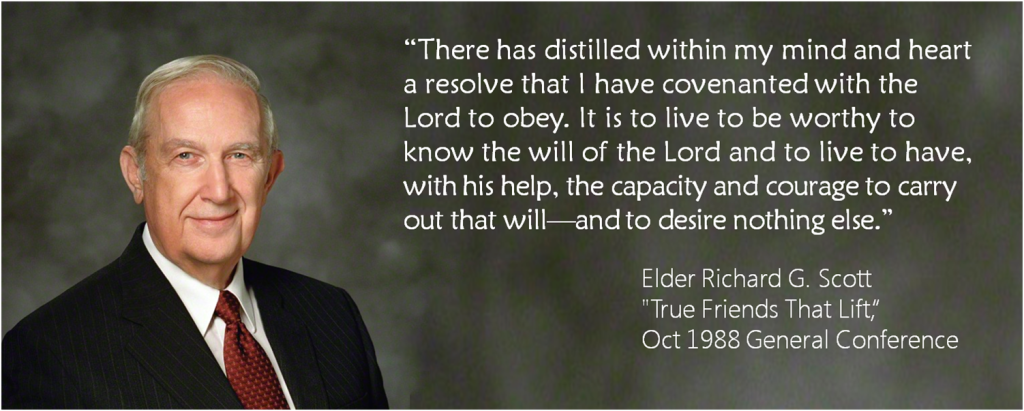 In this quote, Elder Scott expressed in elegant simplicity what it looks like to live in Step 11: “Seek through prayer and meditation to know the Lord’s will and to have the power to carry it out.” Elder Scott points out that our success in doing this is contingent upon our spiritual preparation to receive two important blessings: knowledge of the Lord’s will for us and the power and willingness to carry it out. In this post I am focusing on the first, discerning the Lord’s will.
In this quote, Elder Scott expressed in elegant simplicity what it looks like to live in Step 11: “Seek through prayer and meditation to know the Lord’s will and to have the power to carry it out.” Elder Scott points out that our success in doing this is contingent upon our spiritual preparation to receive two important blessings: knowledge of the Lord’s will for us and the power and willingness to carry it out. In this post I am focusing on the first, discerning the Lord’s will.
The Lord will not compel us to do what would be best for us. That was Satan’s plan. He rarely hits us over the head with personal revelation, either. The Lord’s plan is to allow us to choose our attitudes, work ethic, and activity level. He will grant unto us those things we request which are in harmony with His will, if we do the work necessary to receive them. Two of Elder Scott’s conference talks (“How to Obtain Revelation and Inspiration for Your Personal Life” and “To Acquire Spiritual Guidance“) give us a glimpse of the importance of personal revelation to him and how he went about receiving knowledge of the Lord’s will for him.
What does it take to be spiritually prepared to receive this personal revelation? I think it takes work! Here are six things that I have found to be personally helpful to me as I strive to “live to be worthy to know the will of the Lord and to live to have, with his help, the capacity and courage to carry out that will—and to desire nothing else,” as Elder Scott says.
- I have to humble myself and become willing to receive knowledge of the Lord’s will even when it is not what I was hoping for.
- I have to spend time in the scriptures, not necessarily to find answers there, but to learn to recognize the voice of the Lord, and to quiet my mind and prepare myself to be able to hear with spiritual ears the message the Lord has for me.
- Working my own program – reading the ARP Guide and other 12-Step books and implementing in my life the way of living described there – clears away many stumbling blocks and impediments to receiving knowledge of the Lord’s will.
- Spending time talking to others who are living in a state of recovery helps me feel more able to receive knowledge of the Lord’s will, both directly from Him, and in the words and examples of those I talk to.
- Writing is, for me, one of the most effective and helpful tools for receiving personal revelation. (See Tools: Quality Prayer.)
- Once I receive knowledge of the Lord’s will for me I must act upon it.
I have found that if I do not act upon my promptings quickly, the moment can pass, and I miss out on the blessings that might have been mine. I have also found that if I ignore the promptings I receive for an extended period of time, I lose some of my ability to hear and understand what the Lord would have me do. Sometimes I don’t act because I feel overwhelmed; sometimes because I am afraid. When the Lord wants me to go outside of my comfort zone I tend to question whether I heard Him correctly. Of course He wants me to go outside of my comfort zone! He wants me to grow and reach my full potential! He isn’t finished with me yet.
- Step 11 says, “Seek through prayer and meditation to know the Lord’s will and to have the power to carry it out.” How satisfied are you with your prayer and meditation practice?
- How confident are you that you are able to discern the Lord’s will for you?
- What are you willing to do today to improve in this area?
Please share your thoughts about this post by commenting below.
Related Posts: On Being a Perfect Rosebud, Prayer, Meditation and Pondering, Tuning In,

